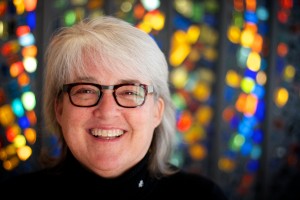By Jeff Brumley
The widening legality of same-sex marriage has ministers and churches across the nation scrambling to respond.
And Baptist pastors are right in the thick of what is in some quarters a frantic search for the right theologies and liturgies with which to meet massive social and legal shifts.
Some of them are adding ceremonies for gay couples who request them, while others are planning to quit signing marriage licenses — for straights or gays — as a way to protect what they see as the biblical definition of marriage.
There are a range of other responses in between, including some that are uniting conservative and progressive Baptists in support of the separation of church and state.
‘Marriage … above my pay grade’
Others say they plan to make no changes and participate in no movements.
One of those is Steve Wells, pastor at South Main Baptist Church in Houston.
Wells referenced a group of East Texas pastors considering a plan stop signing marriage licenses and instead asking couples to sign marriage covenants with their churches. The Baptist Standard reported they are motivated in part by changing definitions of marriage across the nation.
But that isn’t necessary, Wells said. “The definition of marriage within the Christian faith is above my pay grade — that’s set in the [biblical] text,” he told Baptist News Global.
Gays are welcomed as children of God at South Main Baptist, Wells said, but he will not perform weddings for same-sex couples.
“I no more have the authority to marry two people of the same sex than I do three or four people who come to me and say they want to be married,” he said. “We just don’t do that.”
And he plans to continue signing marriage licenses because his authority to conduct weddings comes from God, not the state of Texas.
“I don’t need to abstain from that process nor do I have a worry that the state is going to come back on the church and start … telling us who we can and can’t marry.”
‘A huge win for gay rights’
But there also are Baptists who will not only continue signing marriage certificates, but add gay and lesbian couples to the list.
“This is just so huge, so I will do that without any hesitation,” said Steve Hyde, pastor at Ravensworth Baptist Church in Annandale, Va.
The suburban Washington congregation is a member of the Association of Welcoming and Affirming Baptists. Yet Hyde said he’s never performed a same-sex blessing at the church because he’s never been asked.

But already there are two weddings — for two men and two women — planned through December. Hyde said he’s also on a statewide list of clergy willing and available to perform same-sex weddings.
He said it’s too important a moment not to celebrate — in this case by performing the weddings and signing the related documentation.
“Some of our members have already been married in other states,” Hyde said. Same-sex marriage became legal in Virginia on Oct. 6.
“This is such a huge win for gay rights and equality.”
Churches seek resources, direction
For all of those certain of their actions, there are also pastors and congregations who don’t know what, if anything, they should do given the changing nature of marriage in America.
A growing number of ministers are reaching out to national groups and state organizations for same-sex marriage resources and guidance on how to respond to gay and lesbian couples seeking to be married in their sanctuaries.
In some cases, they are eager to begin performing same-sex marriage but don’t have the liturgies and other materials to do so appropriately, said Robin Lunn, a Baptist minister and executive director of the Association of Welcoming and Affirming Baptists.

“As same-sex marriage becomes legal across the country, those resources are being requested,” Lunn said. “We definitely have people asking for that.”
Organizations founded to seek equality for LGBT Christians aren’t the only groups being asked.
Larry Hovis, executive coordinator of the Cooperative Baptist Fellowship of North Carolina, said he’s been approached by ministers “requesting guidance on how to grapple with this issue in their churches.”
Now that same-sex marriage is legal in his state, the plan is to gather interested ministers together in a “peer-learning environment” to determine how to navigate “the complex state of marriage in our time,” Hovis said in an email to BNG.
‘Increasingly uncomfortable’
Hovis also raised another subject in his email: his own discomfort in serving as an agent of the state by signing marriage licenses.
Hovis said his concern is not related to the same-sex marriage issue, but rather to the historic Baptist support of the separation of church and state.
“I would welcome a movement toward separating a congregation’s role in blessing Christian marriage from the state’s role in ratifying the legal contract of civil marriage,” Hovis said.

That, too, is part of the concern expressed by Texas pastors who told the Baptist Standard they are meeting Nov. 16. They plan to discuss changes churches can make to their statements of faith, covenant marriage certificates and a proposed state constitutional amendment strengthening religious freedoms.
“I have grown increasingly uncomfortable acting as an agent of the state,” Kyle Henderson, pastor of First Baptist Church in Athens, Texas, told the Standard.
Honoring Baptist tradition
And that’s not just a feeling among Baptists who oppose same-sex marriage. While AWAB is being asked by some churches how to go about acting as agents of the states, some want either to quit or avoid the practice.
“I know plenty of clergy who stay out of signing marriage licenses,” Lunn said. “I would support any clergy who feels convicted not to sign marriage licenses.”
Nancy Petty, pastor at Pullen Memorial Baptist Church in Raleigh, N.C., said she knows this debate from both sides.
Pullen has been blessing same-sex unions for 24 years. Because gay couples could not obtain marriage licenses, Petty said she stopped signing them for straight couples, as well, out of fairness and solidarity.

That has changed since gay marriage became legal in North Carolina on Oct. 10. Since then she has begun signing marriage licenses again.
“That is a significant and historical action in our state and it was important to participate in marrying members who had waited 15 or 20 years to be able to marry in their religious community,” Petty said.
But once the initial phase of same-sex marriage passes, Petty said Baptists must engage in a conversation about the theological appropriateness of ministers signing marriage licenses.
The purpose and role of Baptist ministers never included acting as agents of the state, she said. It’s why she applauds the pastors in Texas for their initiative.
It’s especially true given the historic Baptist position on separation of church and state, Petty added.
“Given our tradition as Baptists, you could make a real important argument that we should only be doing the religious aspect of marrying people,” she said.
